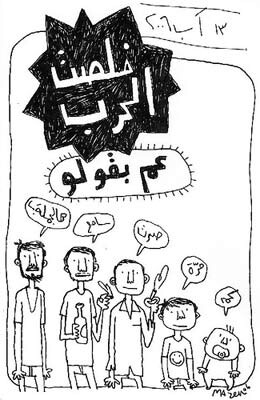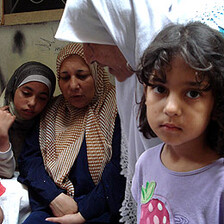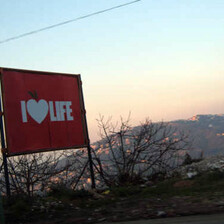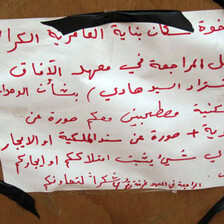Beirut 14 August 2006

Cease-fire Blues”: THE WAR IS OVER/they are saying/how many/times/did/I hear/this sentence? by Mazen Kerbaj. View more of his work.
It is 7:45 in the morning, Ras Beirut. Two explosions wake us up. We run to the TV set.
“Is it on Dahiyeh? No, they sound like the flyers’ explosions.” Nothing on the news. Then another, louder explosion and paper rain starts to fall on us. All the neighborhood are out on their verandas looking at them as they drop from the sky.
“What is in there?” A father shouts at his son to go get one. Two workers pick one up, they start to read out loud:
“To the Lebanese: We would like to inform you that we are going back to hit Hizbullah, Syria and Iran! Signed, Israeli Defence Force.”
The first reaction comes from the building next to me, a woman swears at them and says, “When did you ever leave to come back? F—- you and the world.” She turns her back and maybe goes back to sleep.
Another woman says, “Come back? What else is left to destroy? And who will prevent you from coming; you have the world on your side.” A refugee woman answers, “We have God on our side, and God is just.”
A last comment is from another man, who says, “The one who is leaving tries to leave a good memory behind. These are Israeli souvenirs by excellence.”
Everybody turns back to the confines of their rooms; maybe like me they learn of the two crimes the Israelis committed just a few minutes before they left. Ten minutes before eight, a minibus of passengers was hit in the outskirts of Baalback - nine casualties. Five minutes before eight, an air raid on the Ayn el Helweh refugee camp kills two and injures five.
These are the messages of force the Israelis are sending us before they leave. They are sending them with hatred and revenge, after they struggled over the weekend to grasp a victory from the claws of the resistance in the south. Thirty-thousand ground troops started a mass ground offensive that was announced after the UN resolution 1701 was passed by the UN Security Council. The more casualties were inflicted on them by the resistance - 24 Israeli soldiers died on Saturday, a helicopter was shot down, an Israeli boat was hit along with many Mirkavas, the glorious symbol of invincibility of the Israeli army - the more vengeful towards civilians they became. The Israeli Air Force went crazy, hitting all what they had left before, factories, gas stations, homes. Twenty tons of explosions in two minutes were dropped on the suburbs of Beirut. Gifts the Israelis left before they leave, so we remember what Israelis are like.
Today at eight supposedly the UN resolution 1701 will be enacted to protect the civilians, nothing less, nothing more. At eight, Israel will announce the beginning of the truce. At eight thirty, Israel will announce that the air and sea blockade on Lebanon will not be lifted so as to “control arm smuggling to Hizbullah.”
“So what does protecting civilians mean, can the world tell us please?” my neighbor asks.
“Slow death instead of one blow death,” the owner of the neighborhood grocery store says.
“Did not the UN mention that the air and sea blockade will be lifted?” Tarek, our neighbor, asks.
“They did, uncle, but they did not set a time for that, so Israel can decide on its own terms when she’d like to lift the siege and Israel can come also and hit us and call that self-defense and this is legitimate under the UN resolution 1701.”
It is the last day of shelling attacks on civilians, the first day of the ongoing siege that will last for as long as Israel wishes, while the world watches.
Good morning Beirut. Good night world - hope you are sleeping well.
Mayssoun Sukarieh is a native of Beirut.
Related Links





